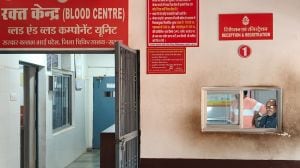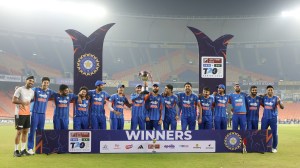Illegal mining of minor minerals in Karnataka: ‘Inadequate workforce led to difficulty in monitoring’
Since election results were announced on May 15, Karnataka has been in news due to jostling among political parties to form the government. One major issue that was raised during pre-election rallies was illegal mining in the state.
 All cases of illegal mining of iron ore were handed to CBI by the Karnataka government in 2013 (Express Photo/Ruhani Kaur/File)
All cases of illegal mining of iron ore were handed to CBI by the Karnataka government in 2013 (Express Photo/Ruhani Kaur/File)
Since election results were announced on May 15, Karnataka has been in news due to jostling among political parties to form the government. One major issue that was raised during pre-election rallies was illegal mining in the state.
The Indian Express has learnt that Karnataka’s commerce secretary told the Ministry of Mines about two months ago that while the state has “efficiently controlled” the illegal mining of major minerals, it is still facing “illegal mining related challenges” for minor minerals due to “inadequate workforce”.
In India, the classification of ‘minor minerals’ and ‘major minerals’ has been done according to Mines and Minerals (Development and Regulation) Act, 1957. Some of the minor minerals listed in the 1957 law are mica, granite, gypsum, solomite, sand and clay. Minerals such as coal, manganese and iron ore are classified as major minerals.
In July 2011, the Supreme Court banned mining of iron ore in Karnataka following allegations of illegal mining that had resulted in large-scale abuse of the environment. The apex court on April 18, 2013, had allowed iron ore mining in Karnataka, but with the cap of 30 million tonnes per annum.
On March 8, 2018, the Coordination Cum Empowered Committee (CCEC) meeting was held in New Delhi under the chairmanship of the secretary of the Ministry of Mines. Top officials of mining departments of mineral-rich states were present at this meeting. According to the minutes of the meeting, R K Kataria, secretary of commerce and industries (mines and MSME), Karnataka, stated: “Illegal mining of major minerals has been efficiently controlled and is no longer a significant issue in Karnataka.”
He added: “For minor minerals, the state is still facing illegal mining related challenges. In adequate workforce has led to great difficulty in physical monitoring of mines.” He stated that the state has amended rules pertaining to illegal mining. “Confiscation of vehicles engagedd in illegal mining in addition to seizure of material and equipment has been introduced in the amended rules. The penal provisions have been made stricter, the offenders are now required to pay double the value of confiscated vehicle and five times the value of royalty of material that has been seized,” he stated.
All cases of illegal mining of iron ore were handed to CBI by the Karnataka government in 2013. Among the accused were the Reddy brothers of Bellari, two of whom were elected on May 15, 2018, on BJP tickets. CBI cases’ charges were related to the illegal export of ore worth Rs12,000 crore from 9 ports spread across 4 states. Four years later, when the Karnataka elections were coming near, the CBI began to close the cases in state after state, citing technical reasons.
- 01
- 02
- 03
- 04
- 05































